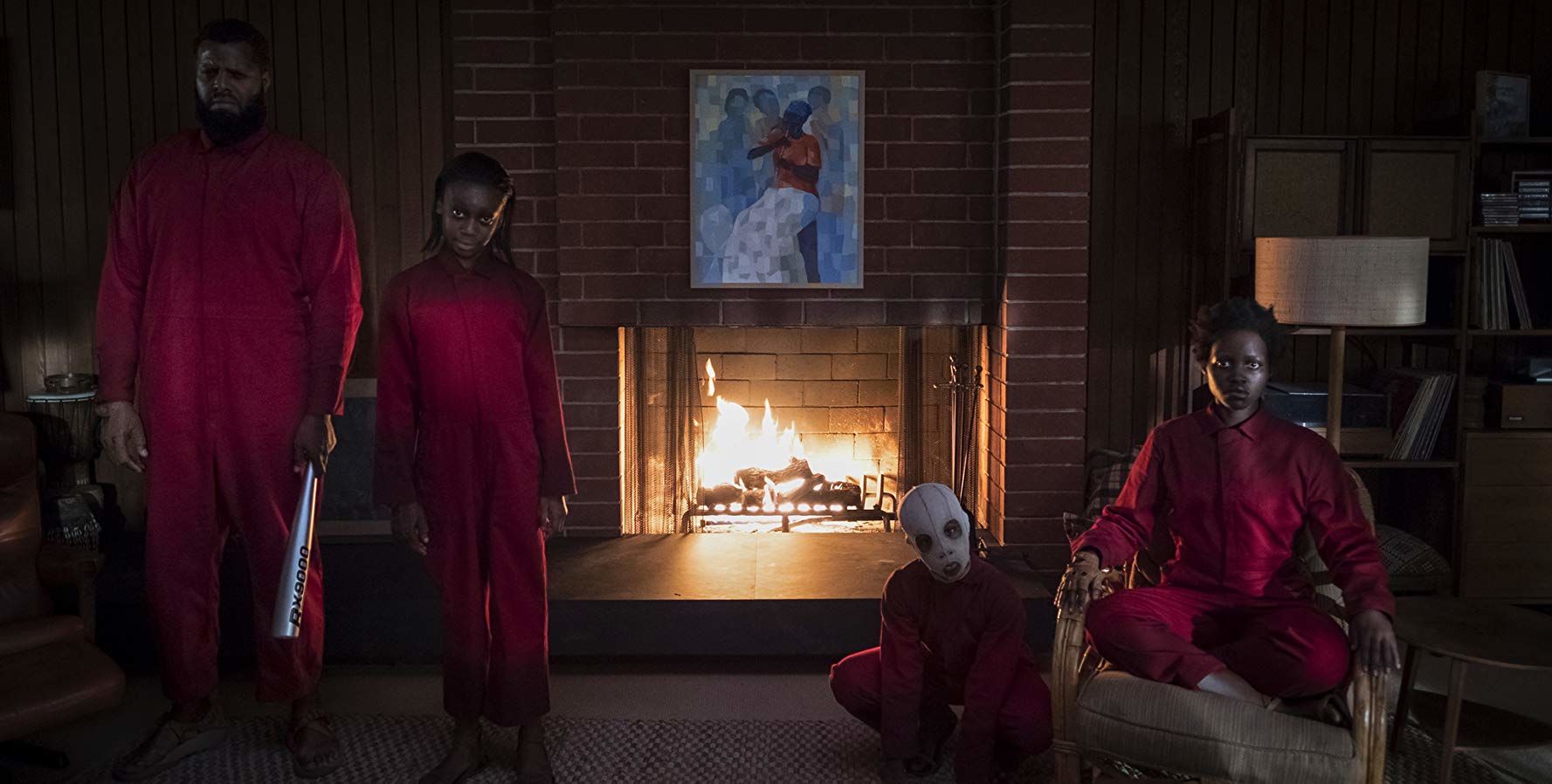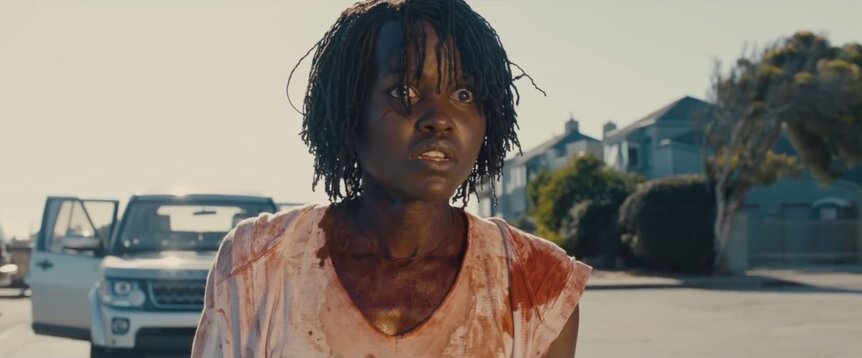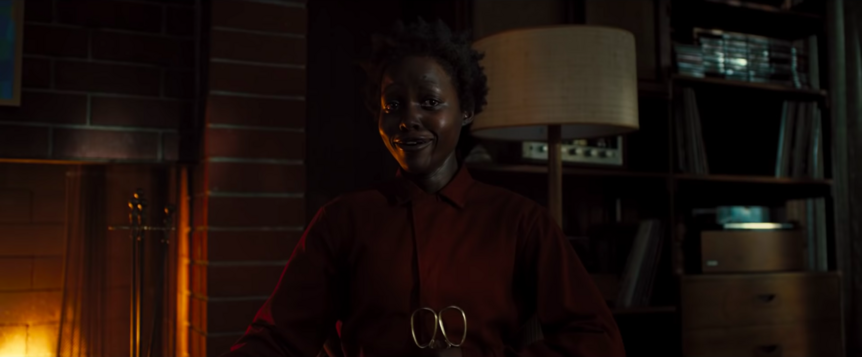Create a free profile to get unlimited access to exclusive videos, sweepstakes, and more!
How Jordan Peele used the abject to break blackness and the modern horror genre

I left the theater after seeing Jordan Peele's Us on opening weekend feeling not scared, but disturbed. His story of a family that goes on a vacation only to end up in a world-changing situation did have some shocks. However, the film isn't scary enough to have me afraid of drains for a week like It. I wasn't petrified of seeing a saw-fingered boogeyman in my dreams like A Nightmare on Elm Street.
No, Us stayed with me, but for an altogether different reason: Peele's toying with the uncanny in black horror and black culture to produce the abject feelings that disturbed me and audiences all over the country. But is this disturbance due to the horror, or is Peele's overplay of the abjection uncovering something even more sinister, something that makes audiences, including me, even more uncomfortable than a horror movie should?
**Warning: The rest of this article contains spoilers for Us **
Us takes place in the California coastal town of Santa Cruz, where a black family is traveling for vacation. Adelaide (Lupita Nyong'o) grew up in the area, but her memories of her childhood stomping grounds aren't all good ones. The home and the area are the childhood stomping grounds for the mother as a girl. The film kicks off with an incident at the boardwalk during her youth, a horrific event that sows the seeds of the "untethering," a violent assault from othered human shadows come to the surface to take the place of their "twin."
THE ATYPICAL IS THE ABJECT
However, Adelaide and her family are not the typical black family. This black, dark-skinned woman is married to Gabe, a very large black man (Winston Duke). They have two kids, Zora and Jason (Shahadi Wright Joseph and Evan Alex, respectively). As soon as they get to the house, Gabe gets out of the car and dabs right there in the driveway. It's a dance move that hasn't been black since little white boys started doing it while playing Fortnight. Now it's a corny white dad (and a Gabe) thing.
This family isn't just atypical. Their ways go against traditional behavior for black people. Later, Jason runs away from the dinner table to get a toy and then curses and picks with his food. Zora follows up with some backtalk about the sport she is not going to participate in during the school year, despite her father's adamant encouragement. The two black parents handle the kids with care and love each time, but none of the actions are typical of what we have come to know as the cultural norm for black parents in the film, especially horror movies.
The Wilsons may be a dark-skinned family, but they are acting and sounding as if they are stars in the whitest sitcom on TV. This dissonance is disturbing for black people in the audience, like me, especially but also for whites and other people of color who have become familiar with Hollywood's depiction of a black family. Adelaide's family is not it. There is something about their mannerisms and behaviors that seems wrong from the beginning. Our reaction to seeing this is abjection.
THE WILSONS CONJURE ABJECTION FOR THE AUDIENCE
Academic Julia Kristeva gave the best explanation of abjection in her essay Power of Horror, writing that the abject was a deeply troubling lack of familiarity.
"What is abject," she writes, "the jettisoned object is radically excluded and draws me toward the place where meaning collapses … A massive and sudden emergence of uncanniness, which, familiar as it might have been in an opaque and forgotten life, now harries me as radically separate, loathsome. Not me. Not that. But not nothing, either. A 'something' that I do not recognize as a thing."
What provokes the abjection with watching this family is that they look like a black family. The dad even wears gear from a historically black college; they all have the undeniably dark skin. But their words are stuck in the type of codeswitching that Sorry to Bother You designated as the "white people voice." Their tone, diction, and dialect lack the African American Vernacular English that signals we are talking to black people.
Then there's the mannerisms and behavior. Gabe is a corny white version of himself who dabs. Even next to an actual white dad, Gabe gets even whiter in his mannerisms. The white guy is the cool guy. The same with Zora and the white daughters. And black girls are the source of urban fashion trends and have been for years! Not Adelaide's daughter, though. Jason is just weird and imaginative alone. The black family is typically the cool family in these movies, but these guys are not it.
They are black, but not black. You can't call them white, either. They don't match the examples that have been put up by Hollywood for decades. There is something off about this family, but we can't put our finger on it. They are no longer familiar, and the more we see them interact with the world, the worse the feeling gets. The moment when the family meets their tethered other is when our reality collapses.
Let's put this another way. I come from a family of avid horror film aficionados. I remember being with other black people in the theater to see Friday the 13th while hearing my aunties and her friends mumble, "this why black folks ain't in this movie, we don't go to no scary-ass woods to get chopped up," or "a black woman would not go looking of the creepy white dude, we would've been home."
"Black folks wouldn't do this," and "Black folks wouldn't say that," are all phrases that back kids like me grew up hearing. These served as a pseudo-explanation to smooth over our absences of representation in horror films, always explaining away the token black character dying in the first 10 minutes of the film. Not seeing ourselves or seeing a stereotype of caricature became the norm. We've always viewed ourselves in horror films through the white man's gaze. With Us, that's gone.
THE ENTIRE HORROR GENRE IS IN DANGER
Adelaide's family not only throws us for a loop. It jettisons the entire horror genre.
In Genre Anxiety and Racial Representation in 1970s Cinema, George Lipsitz wrote, "Genre conventions encourage the repetition, reconfiguration, and renewal of familiar forms in order to cultivate audience investment and engagement…Their conventions contribute to an ahistorical view of the world that is always the same…But sometimes small changes in generic forms serve as a register of broader alterations in society at large."
The horror genre has thus created an image of the black family as the one that stays on the periphery, does not go very far in the plot and who maintains their "urban-ness," their "cool" despite the problems they face in the film. The black characters are jaded or overly aware and don't fall for the same shenanigans that the white main characters do. Scary Movie illustrated this using their Regina Hall character, who shouted all the "Black folks wouldn't…" knowledge, was the trendiest of her group, and still died early in the film.
But, Us puts forth a challenge to that horror trope just as Lipsitz describes. Peele's presentation of the Wilson family in a way that conjures abjection in the audience is necessary to pull us away from the familiarity that we have been wallowing in, to reframe blackness in the horror genre. Peele's manipulation of the family to make them uncanny in the most subtle ways does not offer us any type of alternative once the idea we have collapsed.
Once Peele forces us to sit with our abject feelings of a black family in horror, he piles on the uncanny in the movements. Adelaide's tethered other makes in their fight/dance the most unnerving scene of the film, for example. The uncanny is also in the "voices" of the Tethered and the way they try to mimic the movements of their tethered partners, but fail because they don't have all of the human parts needed to do so. No vocal cords, part of a soul.
Even the "Hands Across America" formation is abject in its use well over 20 years after the original date and using people who aren't truly human. These uncanny bits come together to heighten the abjection, the disturbance felt by the audience. It also helps undo traditional blackness horror as we know it.
By the time the Us ends, the audience is just as broken as the family and our relationship with the horror genre is as well. Peele offers no replacement.
This is why I tell people that Us isn't scary, but it is horror. It is the use of abjection to implode the ideals of blackness in the horror genre as we know it. To rid us of what was toxic and prepare us for a change.
What more is in store? Only Peele knows. Whatever the next step is, Us is a damn good start of something new.




























